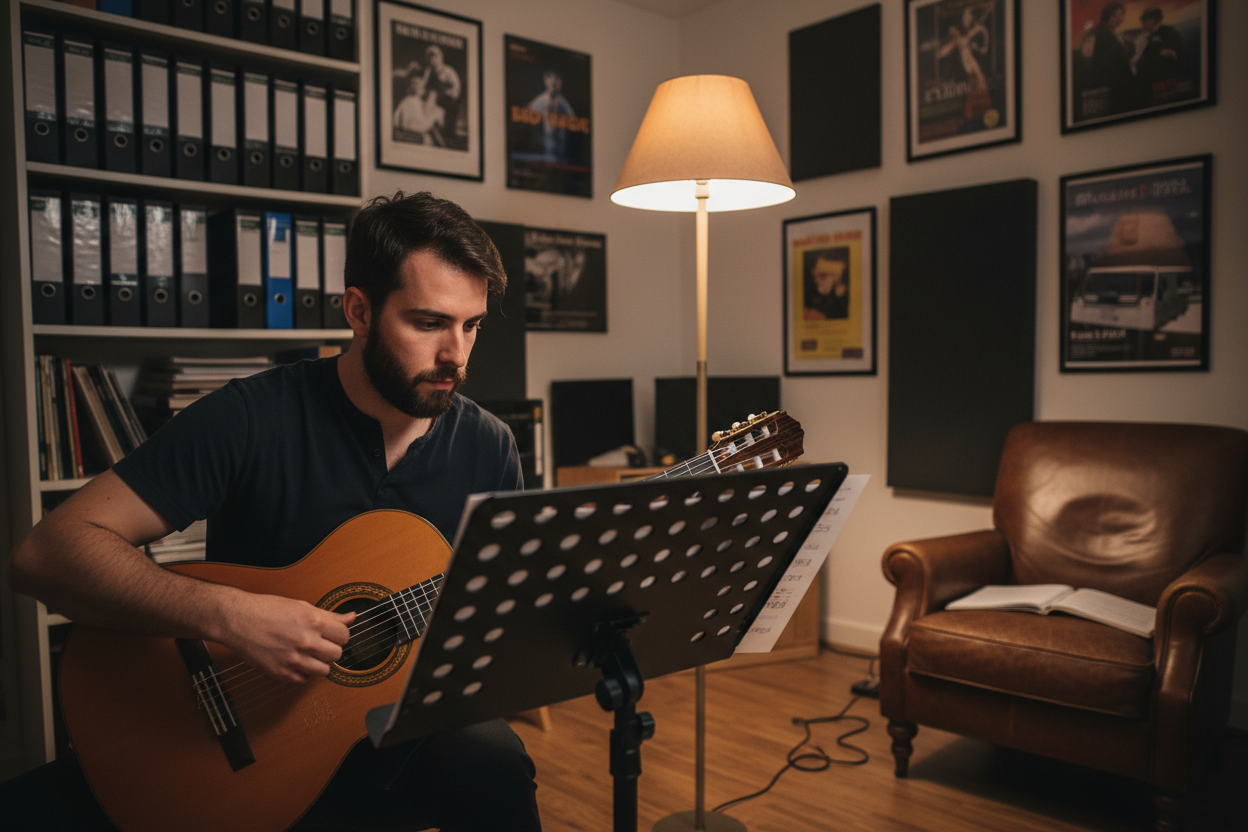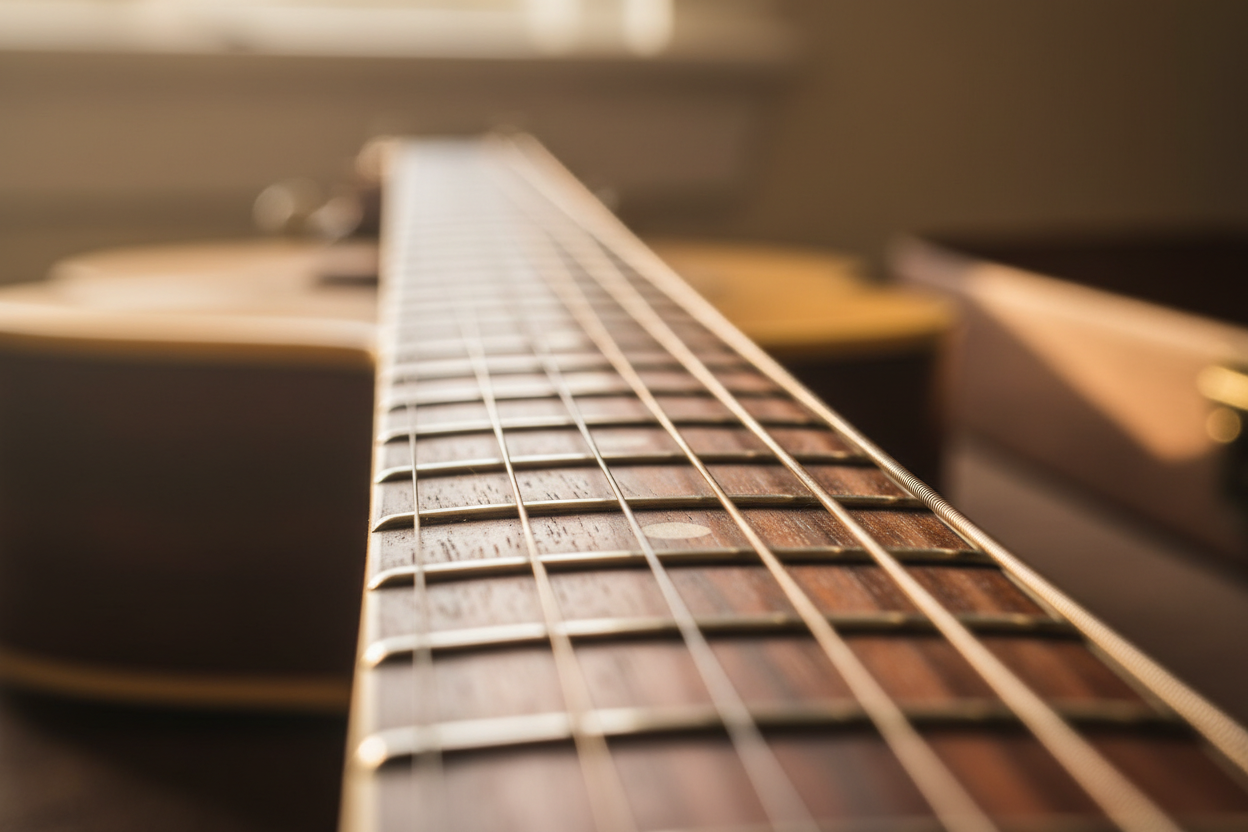Being a creative musician takes practice, experimentation, and a willingness to step out of your comfort zone. To help spark your creativity, here are 15 tips for guitarists of all skill levels. From listening to a wide variety of music to collaborating with other musicians, these tips will help you develop your skills and discover new ways to express yourself through your instrument.
1. Record yourself playing and listen back to it. This allows you to analyze your performance from a different perspective and identify areas for improvement. By paying attention to any errors or weak areas that you may have missed during the live performance, you can work on them and come up with fresh ideas to enhance your recordings and creations.
2. Practice improvisation to develop your ability to think on the fly. Improvisation is a key skill for any musician, and will help you to come up with new ideas and riffs in the moment, rather than relying solely on pre-written material.
Practicing improvisation will help you to think quickly and creatively while playing, allowing you to respond to other musicians in real time. It also encourages you to be more aware of the music around you, developing your ability to react to the energy of the room and your fellow players.
3.Try writing music with a specific emotion in mind. Writing music with a specific emotion in mind can help you to tap into your own feelings and create more meaningful and personal music. This means that before you start writing, take some time to think about what you want to express, whether it's a feeling of happiness, sadness, longing, or any other emotion. Once you have a clear idea of the emotion you want to convey, you can then start to experiment with different chord progressions, melodies, and lyrics that will help you to capture that emotion in your music. This process can help you to create more personal and authentic music that connects with your audience on a deeper level. Additionally, it can also help you to express yourself in a more cathartic way, allowing you to process your own emotions through your music.
4. Try playing with different guitar effects and pedals. Experiment with different effects pedals and explore the range of sounds you can create. Try blending in different types of distortion, delay, reverb, chorus and wah effects. You can combine multiple effects pedals to get a unique sonic palette. Experiment with your own settings and find the sound that fits your style. Learn how to use each pedal individually and then explore how they interact with each other. With enough experimentation, you can develop your own signature sound that is truly unique.
5. Use a metronome to work on your timing and precision. A metronome is a great tool for improving your timing and precision, which is essential for playing in a band or ensemble. Your creations will sound better when you have perfected your timing.
6. Collaborate with other musicians to learn from their techniques and perspectives. Collaborating with other musicians can offer many benefits. Firstly, it allows musicians to work together to create something unique and beneficial to everyone involved. It also gives opportunity to learn from each other’s techniques, perspectives and experiences. Additionally, it provides an opportunity for growth, facilitating the development of new skills and discovering fresh ideas and concepts. Furthermore, collaboration can be a great way to make connections with potential bandmates and music industry contacts, allowing for further opportunities in the future. Ultimately, collaborative music projects are an amazing way to elevate everyone’s craft and inspiring each other to produce great art.
7. Study the work of your favorite guitarists to learn from their styles and techniques. Examine the guitar playing of your favorite musicians in detail to understand their unique approaches and techniques. Listen to and watch their playing to get an understanding of how they approach melodies, chords, solos, and improvisation. Analyze their use of riffs, licks, and other guitar parts in their songs. Research the type of gear they use, such as amps, effects pedals, and guitars. Learn from their tone and sound by mimicking their set up and approach. Pay attention to their articulation and note choice. Practice the songs they have written and discover the patterns they use. See how they create tension and release with their playing. Explore the range of sounds they create, and try to replicate them in your own playing.
8. Learn to play in different musical genres to broaden your skill set. Playing in different genres will help you to gain a better ear for music, as well as help you to recognize similarities between genres. Additionally, playing in different genres can help expand your creativity, allowing you to find new and unique ways of expressing yourself musically. Learning to play in different genres will help make you a more versatile musician, allowing you to adapt to different playing conditions and situations.
9. Practice playing music by ear to develop your ability to hear and replicate different sounds. Practicing playing music by ear can help any musician hone their ability to hear and replicate different sounds. Playing by ear helps you to comprehend the fundamentals of a piece of music and can give you the proficiency to recreate complex sounds without relying on notation. Training your ear to recognize various tones, harmonies, and melodies can help you become a much more proficient musician.
10. Write music in different keys and time signatures to challenge yourself. Writing music in different keys and time signatures will challenge your understanding of music theory and help you to develop your skills as a musician.
Trying out new keys can easily be done by using a capo. A capo allows you to shift the keys of a song without having to transpose all the chords. Experiment with alternate time-signatures such as 5/4, 7/4, or 11/8. By writing music in different keys and exploring these alternate time-signatures, you can create unique and interesting pieces.
Additionally, by rethinking how you approach writing music, you can challenge yourself to create music that is both melodic and rhythmic. This will help with developing your overall musicianship and help you build a better foundation for any style of music you may encounter.
11. Play along with backing tracks to practice playing with a full band. You can use backing tracks to practice playing with a full band or ensemble, as if you were in a real-life situation. This can help you become familiar with playing with other musicians, as well as developing your musical skills, such as creativity, timing, rhythm, and precision.
You can use a variety of software programs or online tools to find backing tracks for the instruments you want to play along with, or you can create them yourself. Once you have a backing track, you can practice playing along with it on your instrument, which will give you a more realistic band experience and help you hone your skills. Playing along with backing tracks is also a great way to rehearse for live performances, as it will enable you to practice performing in a more realistic manner.
12. Use a loop pedal to create complex layers of sound. By using the pedal's looping function, you can record a single sound or phrase and then layer it over itself to create multiple parts of a song, such as a verse and chorus. You can also use the pedal to layer multiple instruments, including guitar, vocals, drums, and bass. This can help you create a full-sounding arrangement and allow you to experiment with different combinations of sounds. Furthermore, you can use the pedal to layer multiple sound effects, such as reverb and delay, to create unique sonic textures. With a loop pedal, you can explore new possibilities and craft sounds that you may not be able to replicate with conventional instruments or recording techniques.
13. Take a break from guitar practice and do something else to inspire fresh ideas. Taking a break from guitar practice can help you to come back to your instrument with fresh ideas and renewed energy. Doing something else that inspires creativity can help with this. Examples of things to do include drawing, reading, listening to music, watching an educational video, or writing in a journal. Spending time outdoors in nature can also be great for allowing your mind to wander and come up with creative solutions. Finally, it can be useful to take a break from any type of creative activity and do something relaxing or different to get a fresh perspective.
14. Learn to play a new instrument to gain a new perspective on music and guitar playing. Learning to play a new instrument can help creativity in many ways. First, having a different style of instrument to work with can introduce different sounds and textures that can be used to create new compositions. Additionally, understanding the technical aspects of a new instrument can help one get out of their comfort zone and explore different styles and techniques that can lead to new ideas. Playing a different instrument can help the musician gain more insight into various genres, enabling them to expand their creative vision. Learning to play a new instrument provides opportunities to learn more about music and gain skills that can give an artist the tools to create unique and exciting works of music.
15. Try playing your favorite chord progressions or songs in reverse. Playing your favorite chord progressions or songs in reverse can open up some new creative possibilities. It can make them sound unexpected and unique. For example, the legendary guitarist Richie Blackmore came up with the famous Smoke on the Water riff by simply playing the chords of Beethoven's Fifth in reverse. You may find that when you reverse the order of chords in a song, it can create some really interesting sounds. So if you're looking for new ideas or want to try something different with your music, why not give reversing songs a try? It could be just the thing to give your music that extra edge!
In conclusion, the key to sparking creativity as a guitarist is to approach your craft with an open mind and a willingness to experiment. Whether you're a beginner or a seasoned pro, try out these tips and see how they can help you take your playing to the next level. Remember to always be curious and take risks, it's by trying new things that you will discover your own unique voice as a musician. Keep in mind that creativity is a continuous process and requires patience, so don't be discouraged if you don't see results right away. Keep practicing and experimenting, and you'll be sure to find your own creative style on the guitar.




